

Garden path sentence. As a person reads a garden path sentence, the reader builds up a structure of meaning one word at a time.
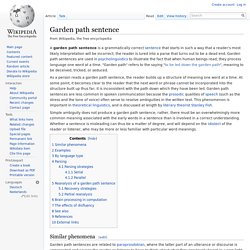
At some point, it becomes clear to the reader that the next word or phrase cannot be incorporated into the structure built up thus far; it is inconsistent with the path down which they have been led. Garden path sentences are less common in spoken communication because the prosodic qualities of speech (such as the stress and the tone of voice) often serve to resolve ambiguities in the written text. This phenomenon is important in theoretical linguistics, and is discussed at length by literary theorist Stanley Fish. Simple ambiguity does not produce a garden path sentence; rather, there must be an overwhelmingly more common meaning associated with the early words in a sentence than is involved in a correct understanding.
Similar phenomena[edit] Time flies like an arrow; fruit flies like a banana. (For the classically minded, the first half also functions as a garden path sentence. List of linguistic example sentences. The following is a partial list of linguistic example sentences illustrating various linguistic phenomena.
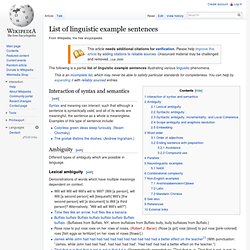
Interaction of syntax and semantics[edit] Syntax and meaning can interact, such that although a sentence is syntactically valid, and all of its words are meaningful, the sentence as a whole is meaningless. Examples of this type of sentence include: Ambiguity[edit] Different types of ambiguity which are possible in language. Lexical ambiguity[edit] Demonstrations of words which have multiple meanings dependent on context.
Will will Will will Will's will to Will? Syntactic ambiguity[edit] Demonstrations of ambiguity between alternative syntactic structures underlying a sentence. Syntactic ambiguity, incrementality, and Local Coherence[edit] Demonstrations of how incremental syntactic parsing leads to infelicitous constructions and interpretations. Every farmer who owns a donkey beats it.[8]Somewhere in Britain, some woman has a child every thirty seconds. Embedding[edit] Word order[edit] Buffalo buffalo Buffalo buffalo buffalo buffalo Buffalo buffalo. The sentence's meaning becomes clearer when it's understood that it uses three meanings of the word buffalo: the city of Buffalo, New York, the somewhat uncommon verb "to buffalo" (meaning "to bully or intimidate"), as well as the animal buffalo.

When the punctuation and grammar are expanded, the sentence could read as follows: "Buffalo buffalo that Buffalo buffalo buffalo, buffalo Buffalo buffalo. " The meaning becomes even clearer when synonyms are used: "Buffalo bison that other Buffalo bison bully, themselves bully Buffalo bison. " That that is is that that is not is not is that it it is. That that is is that that is not is not is that it it is is an English word sequence demonstrating lexical ambiguity.
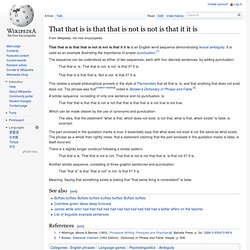
It is used as an example illustrating the importance of proper punctuation.[1] The sequence can be understood as either of two sequences, each with four discrete sentences, by adding punctuation: That that is, is. James while John had had had had had had had had had had had a better effect on the teacher. The example refers to two students, James and John, who are required by an English test to describe a man who, in the past, had suffered from a cold.
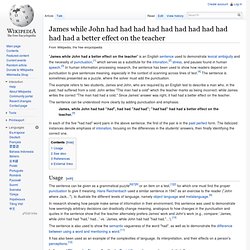
John writes "The man had a cold" which the teacher marks as being incorrect, while James writes the correct "The man had had a cold. " Since James' answer was right, it had had a better effect on the teacher. English is a crazy language. The joy of English pronunciation - Pentadactyl. If your browser does not display the IPA part of Unicode correctly, here is a PDF version of the same thing.
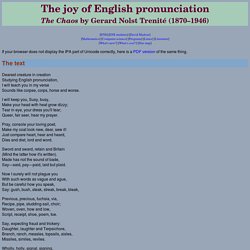
The text Dearest creature in creation Studying English pronunciation, I will teach you in my verse Sounds like corpse, corps, horse and worse. I will keep you, Susy, busy, Make your head with heat grow dizzy; Tear in eye, your dress you'll tear; Queer, fair seer, hear my prayer. Pray, console your loving poet, Make my coat look new, dear, sew it! Just compare heart, hear and heard, Dies and diet, lord and word. Sword and sward, retain and Britain (Mind the latter how it's written). Wicked spelling.